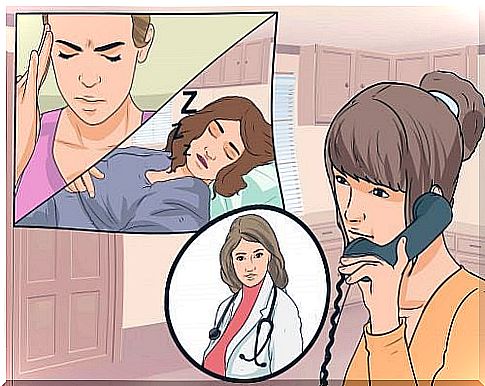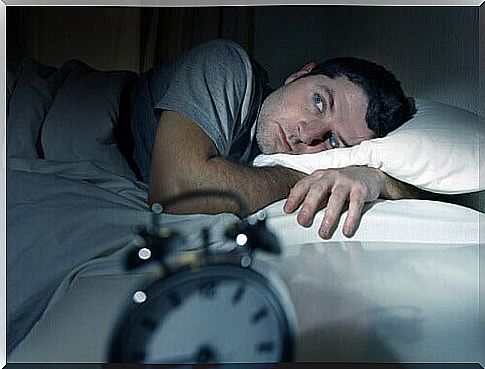Did You Know That There Are Different Types Of Insomnia?
If you suffer from insomnia, be aware that not all insomnia is the same.

Depending on when of the night they appear and how long they last, we can talk about different types of insomnia that may or may not need help.
Difficulty falling asleep or maintaining sleep is a very common problem these days.
In this article we will tell you about the most important insomnia.
What is insomnia?
Not being able to sleep one night because we are very anxious about a transcendental event (a trip, a move, a wedding, etc.) is normal and we have no reason to worry about it.
The problem is when problems with reconciling sleep become a rule and not an exception.
Insomnia affects a large percentage of the world’s population and it can occur at bedtime or at dawn (waking up and not being able to go back to sleep).
It is divided according to the duration:
- Acute if it lasts less than a month.
- Subacute if it continues for 4 to 6 weeks.
- Chronic if it lasts more than 6 months without having solved the problem.
There are many causes of insomnia, but it is mainly due to psychological alterations such as stress, depression or anxiety.
In some people, it is due to a hormonal imbalance or may be linked to certain problems with the circadian rhythm (which regulates sleep and wakefulness).
On the other hand, we should know that insomnia can have other origins, such as:
- Poor conditions of the resting place
- Irregular sleep patterns
- Hearty dinners
- Consumption of substances that stimulate the nervous system (coffee, alcohol, drugs, etc.).
Additionally, some people may experience insomnia after surgery, abstinence from alcohol, post-traumatic stress disorder, or as a side effect of medication.
Can we control insomnia?

We can prevent the occurrence of this problem and prevent it from becoming something chronic if we have healthy habits:
- Do not consume exciting substances in the evening.
- Light dinner.
- Exercise, as much as possible until nightfall.
- Arrange the bedroom and reduce noise and lights.
- Maintain a routine for sleeping and waking hours.
- Take a relaxing bath in the evening.
- Do not watch TV or cell phone in bed.
- Avoid prolonged naps.
Rest is fundamental for our body, because it repairs and restores it, the thermoregulates and prepares it for the activities of the next day.
So, insomnia can have many negative consequences, among which we find:
- Difficulty concentrating or remembering.
- Fatigue, lack of energy and drowsiness.
- Road and professional accidents.
- Irritability, depression and bad mood.
- Disorientation and existential conflicts.
What types of insomnia are there?
The types of insomnia are divided into three main groups: according to duration, severity and time band.
Transient or acute
It is the disorder that lasts a maximum of 4 weeks. It can be explained, for example, by changes in sleep pattern, work schedule or geographic location (what we know as “jet lag”).
Additionally, this type of insomnia can be caused by stress, illness, personal issues, or too much caffeine or alcohol.
Short term or subacute
It lasts 4 to 6 weeks. It is more common in people who have suffered a major accident or the loss of a loved one.
It is also very common to suffer from it as a result of post-traumatic stress.
Long-term or chronic
It lasts more than 3 months and can extend until the person treats the problem. In the majority of cases it is the consequence of a chronic physical or psychiatric illness.
Mild insomnia among the different types of insomnia

It is the most common sleep disorder, because it does not have too negative consequences on the quality of life of the person.
The next day, we will get up more tired or with less desire to work, but without danger to health.
Among the types of insomnia, moderate insomnia
When insomnia becomes something more habitual, the effects are more visible and significant.
The daily deterioration of the person is linked to fatigue, irritability, anxiety and lack of performance in his work.
Bad moods are rife and so are problems with withholding information.
Severe or severe
The sleep disorder in this case is more intense and significantly affects the life of the affected person.
She cannot do any of her daily activities because she does not even have the energy to get out of bed.
In addition, mood swings are increasingly erratic and the person may take medications or certain substances to reverse the situation.
Initial or reconciling insomnia among the different types of insomnia
It appears when lying down and is characterized by difficulty falling asleep until late at night.
The person cannot find an effective method of sleeping (counting sheep, reading, meditating, listening to relaxing music, etc.).
Often times this type of insomnia is caused by anxiety or problems and does not allow the brain to calm down sufficiently.
Intermediate or to keep sleep
In this case, the problem develops at dawn. Although we can get to sleep by going to bed, a few hours later we wake up and cannot sleep any more.
You can also wake up several times during the night.
Terminal or end of sleep
It is also known as morning insomnia. In this situation the person wakes up before the scheduled time of waking up.
It can be explained by a lack of total darkness in the room (with the first rays of the sun when you open your eyes) or a lot of anxiety because of an important event of the day.
And voila, you now know what the different types of insomnia are!









